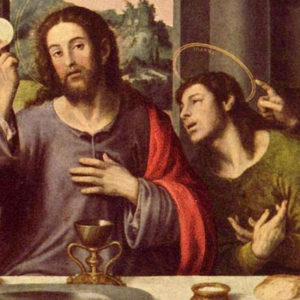
John: The Push-Over
First up is the Beloved Disciple, the disciple whom Jesus loved, John. Unexpected first choice, huh? But let’s look at what he does.
One of his disciples, the one whom Jesus loved, was reclining at Jesus’ side. So Simon Peter nodded to him to find out whom he meant. He leaned back against Jesus’ chest and said to him, “Master, who is it?”

Peter and the others wanted answers, so they turned to the one closest to Jesus. We’ll talk about Peter later on. How quick was John to use, or abuse his closeness with Jesus for his own benefit? He was a push-over, bending to the desires of the majority. How often are your thoughts and opinions influenced by the majority? How much do you value your relationships? Are you willing to exploit those who love you for your own benefit? John was.
Judas: The Betrayer
Of course, when we think of failure we think of Judas, of what not to do. He was the first to leave Mass early, before the meal was over. He didn’t seem too surprised when the Lord handed Him the morsel.
Jesus answered, “It is the one to whom I hand the morsel after I have dipped it.” So he dipped the morsel and took it and handed it to Judas, son of Simon the Iscariot. After Judas took the morsel, Satan entered him. So Jesus said to him, “What you are going to do, do quickly.”

I don’t think most of us compare ourselves with Judas, because it is difficult for us to see our faults. But there are many. We aren’t perfect after all. Do shy away from telling other people about Jesus? Better yet, do we believe that Jesus is our Savior, the Son of God? Judas didn’t. Jesus is the way, the truth, and the life. Do you believe in Jesus? Do you believe that He is who He says He is? Do you believe in the miracles that He performed? Do you believe He can work miracles in your life? Do you believe that what He says is true? Judas didn’t.
Judas didn’t think Jesus was doing what He should’ve done. Judas expected more from Jesus, a different kind of leader, perhaps with a more militaristic style of leadership—one to rule with power and might, instead of humility, weakness, and vulnerability. Judas didn’t “get anything out of it”. He didn’t find what he wanted in Jesus. He thought His way was the better way. For this reason, he betrayed Him. How often do you think you know it all, that you know what’s best? How often do you put your plans for your life before Jesus’ plan? How often do you put yourself first? That’s exactly what Judas did.
Peter: The Denier
The leader of the disciples, our first pope, St. Peter had his fair share of issues as well.
Simon Peter said to him, “Master, where are you going?” Jesus answered him, “Where I am going, you cannot follow me now, though you will follow later.” Peter said to him, “Master, why can I not follow you now? I will lay down my life for you.” Jesus answered, “Will you lay down your life for me? Amen, amen, I say to you, the cock will not crow before you deny me three times.”

Ouch! The truth hurts! Peter said he was willing to die for Jesus, that he loved Him that much. But Jesus knew better. Peter’s words meant nothing, because his actions—as Jesus foresaw—would not live up to them. Remember, Peter not only ran and hid from the accusers, but he denied even knowing Jesus.
How often do you make empty promises? How often do you say things to please others knowing that you will not follow through? Do you tell people “I will pray for you” and then forget to pray for them? Do you promise to follow Jesus, yet find yourself running and hiding when the going gets tough? That’s what Peter did.
Hope in Despair
In these reflections I don’t seek to bring despair on your Holy Week, but rather to make you think. What brings me hope is that even though all of these disciples have their failures and dysfunctions, Jesus chose them nonetheless. This is proof that God lifts up the lowly (Lk 1:52). Jesus came for those of us who are imperfect, who need His help (Lk 5:32). So as our lenten journey comes to an end and we enter into the Holy Week festivities, let’s really pray and reflect on these events, so that we can enter more deeply into the Passion of Our Lord.